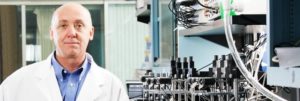If you’re experiencing a headache or pain in your joints, do you reach for an aspirin or Advil? These are common non-steroidal anti-inflammatory drugs or NSAIDs found in almost every home and are among the most widely used drugs in the world. But while they are effective painkillers, most people are unaware of their dangerous effects on the gastrointestinal (GI) tract.
“The major limiting factor of those drugs is they cause significant damage throughout the GI tract and significant bleeding,” said Dr. John Wallace, Chief Scientific Officer and Founder of Antibe Therapeutics. “[People are largely] unaware of the bleeding and ulcers because they don’t cause much pain.”
NSAIDs are thought to damage the cells lining the GI tract (enterocytes) by disrupting an important process in energy production. Through a series of molecular events, the protective lining of the GI tract becomes breached, resulting in inflammation.
Experts like Wallace are bringing more attention to the potential harm of long-term NSAID use, particularly for those who take them for chronic diseases. About 5 million Canadians and 30 million Americans have osteoarthritis, a condition caused by the breakdown of cartilage between joints.
“NSAIDs are the primary treatments [for osteoarthritis] and often doctors switch among NSAIDs,” explains Wallace. “There are some experimental biological agents coming out, but they’re extremely expensive and they don’t work in a significant percentage of patients. The adverse effects can be quite serious.”
The team at Antibe Therapeutics is taking a unique approach: chemically modifying NSAIDs to make them less harmful to the GI tract. The chemical change enables these NSAID-derived drugs to release hydrogen sulfide gas.
While most people may associate this gas with the smell of rotten eggs, it has been shown to have anti-inflammatory activity and to impart protection on the GI tract.
“Hydrogen sulfide can rescue epithelial cells lining the intestine when NSAIDs are causing damage to the molecular machinery that is generating energy,” continued Wallace.
One of Antibe’s leading candidates, ATB-346, is derived from naproxen, an NSAID commonly used to treat osteoarthritis. Not only was the drug found to be safe and effective when tested in rodent models and human patients, but it was found to be far more potent than naproxen itself.

“ATB-346 is six times more potent than naproxen, so we can lower the dose to one-sixth of what it would normally be,” said Wallace. “That was an unexpected finding.”
The compound was also more effective at reducing the rate of ulcers (2.5 percent) compared to naproxen (42 percent). Such a dramatic effect on reducing GI damage could be a gamechanger for osteoarthritis treatment.
“Presently, the patient will be given an NSAID… and often they will also be given a proton-pump inhibitor to block acid secretion,” added Wallace. “Those drugs come with a whole range of adverse effects. We wouldn’t need [them] with our drug.”
Now, the Antibe team is working on a late Phase II clinical trial comparing three doses of ATB-346 in 360 patients with osteoarthritis. The trial is expected to complete by the end of this summer.
The Toronto-based biotech has other hydrogen sulfide-releasing NSAID derivatives in development including ATB-352, an NSAID analgesic that can replace some opioids, derived from ketoprofen for the treatment of post-surgical pain (including in-hospital intravenous formulation and post-hospital tablet form), and ATB-340, an antithrombotic drug derived from aspirin for the maintenance of cardiovascular health with anti-cancer effects.












Join or login to leave a comment
JOIN LOGIN